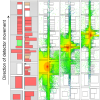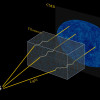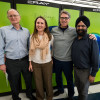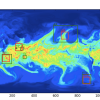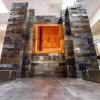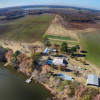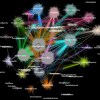News
Berkeley Lab Researchers Develop Platform for Hosting Science Data Analytics Competitions
NNSA is hosting a competition to find innovative algorithms to detect non-natural radiation sources in urban environments, and they've teamed up with researchers in Berkeley Lab’s Computational Research, Nuclear Science and Information Technology divisions to build a Kaggle-inspired data analytics competition platform to host it. Read More »
Helen Cademartori Named CS Deputy for Operations
Helen Cademartori, Biosciences Area Deputy for Operations, is joining the Computing Sciences Area as Deputy for Operations and Operations Deputy for the Computational Research Division (CRD). In her new role, effective mid-May, Cademartori will manage the CS Directorate's Business, Administration, Safety, Property and Information Technology staff. Jonathan Carter, currently CS Deputy and Division Deputy for CRD, will continue in those roles with the new title of CS Deputy of Science. His… Read More »
Tiny Distortions Reveal Clearer Picture of Strands in Cosmic Web
Scientists have decoded faint distortions in the patterns of the universe’s earliest light to map huge tubelike structures invisible to our eyes – known as filaments – that serve as superhighways for delivering matter to dense hubs such as galaxy clusters. Read More »
Pagoda: Communication Software Libraries for Exascale Computing
Berkeley Lab's Scott Baden leads a project directed at providing lightweight communication and global address space support for exascale applications. The effort is known as the Pagoda project. ECP Communications spoke with Baden about the effort. Read More »
Jon Bashor Retires After 27 Years of Service to National Labs
On April 6, CS Communications Manager Jon Bashor retires from Berkeley Lab leaving not only professional but personal legacies. Read More »
Secretary of Energy Rick Perry Visits Berkeley Lab
During his visit to Berkeley Lab's Shyh Wang Hall, Energy Secretary Rick Perry learned about our computational research program, toured NERSC and transferred 500GB of data over ESnet. Read More »
Deep Learning at 15 PFlops Enables Training for Extreme Weather Identification at Scale
Petaflop per second deep learning training performance on the Cori supercomputer at NERSC has given climate scientists the ability to use machine learning to identify extreme weather events in huge climate simulation datasets. Read More »
Underground Neutrino Experiment Could Provide Greater Clarity on Matter-Antimatter Imbalance
A new underground neutrino experiment could provide greater clarity on matter-antimatter imbalance in the Cosmos. And NERSC will be the principal site for data processing and analyses throughout the course of the experiment. Read More »
'Farm of the Future' Project Marries Microbiology, Machine Learning
There’s a farm in Arkansas growing soybeans, corn, and rice that is aiming to be the most scientifically advanced farm in the world. Soil samples are run through powerful machines to have their microbes genetically sequenced, drones are flying overhead taking hyperspectral images of the crops, and soon supercomputers will be crunching the massive volumes of data collected. Read More »
A Game Changer: Metagenomic Clustering Powered by HPC
A team of researchers from Berkeley Lab's CRD and JGI took one of the most popular clustering approaches in modern biology—the Markov Clustering algorithm—and modified it to run quickly, efficiently and at scale on distributed-memory supercomputers. Read More »







 Instagram
Instagram YouTube
YouTube